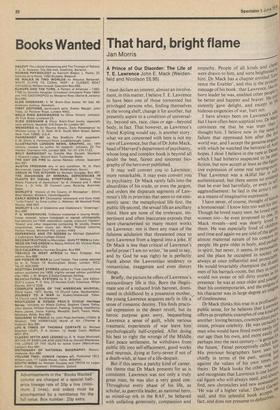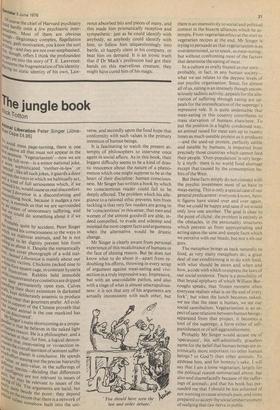That hard, bright flame
Jan Morris A Prince of Our Disorder: The Life of T. E. Lawrence John E. Mack (Waldenfeld and Nicolson £6.95) I must declare an interest, almost an involvement, in this matter. I believe T. E. Lawrence to have been one of those tormented but privileged persons who, finding themselves
in the wrong shell, change it for another, but presently aspire to a condition of universality, beyond sex, race, class or age—beyond body, in fact. That however, as Lawrence's friend Kipling would say, is another story: what we are concerned with here is not my view of Lawrence, but that of DrJohn Mack, head of Harvard's department of psychiatry, whose long and complex book is beyond all doubt the best, fairest and sincerest biography of the hero ever published.
It may well convert you to Lawrence: more remarkable, it may even convert you to psychiatry. Dr Mack rarely falls into the absurdities of his trade, or even the jargon, and orders the disparate segments of Law rence's life in priorities that seem.to me emi nently sane: the metaphysical life first, the public life second, the sexual life an ancillary third. Here are none of the irrelevant, im pertinent and often inaccurate exposés that have characterised so many recent works on Lawrence: nor is there any trace of the fulsome adulation that threatened once to turn Lawrence from a legend into a joke. If Dr Mack is less than critical of Lawrence's awful prose ('I am no writer,' he used to say, and by God he was right) he is perfectly frank about the Lawrentian tendency to romanticise, exaggerate and even distort things.
Briefly, the picture he offers of Lawrence's extraordinary life is this. Born the illegitimate son of a reduced Irish baronet, dominated in childhood by a possessive mother,, the young Lawrence acquires early in life a sense of romantic destiny. This finds practi cal expression in the desert revolt, but its heroic purpose goes awry, bequeathing Lawrence a sense of guilt, while various traumatic experiences of war leave him psychologically half-crippled. After doing his best to right the wrongs of the Middle East peace settlement, he withdraws from public life into self-effacement, good works and neurosis, dying at forty-seven if not of a death-wish, at least of a life-despair.
But if this seems a patchy kind of career, the theme that Dr Mack presents for us is consistent. Lawrence was not only a truly great man, he was also a very good one. Throughout every phase of his life, as scholar, as guerrilla leader, as national hero, as mixed-up erk in the RAF, he behaved with unfailing generosity, compassion and
empathy. People of all kinds and classes were drawn to him, and were heightened b). him'. Dr Mack has a chapter entitled '1-a; rence the Enabler', and this is the princil9 message of his book : that Lawrence, like° born leader he was, enabled other PeoPlei: be better and happier and braver. He ; sistently gave delight, and except in " hideous exigencies of war, hurt not I have always been on Lawrence's but I have often been sceptical too. Dr °I convinces me that he was truer than f thought him. I believe now in the serl1 failure that oppressed him after the world war, and I accept the genuine anglasb with which he watched the betrayal 010 Are hopes. I think I believe in the rape at ()e shra"; which I had hitherto suspected to be fiction, but now accept at least as the figa;r:/, tive expression of some real turning-0"j', That Lawrence was a skilful liar is Wac'e authenticated, but there seems no evirierilf. that he ever lied harmfully, or even. in elf' that
: he lied in the artist's Wa'' as a means of imaginative expression. to
I have never, of course, thought of On a homosexual : I know him too well for lha); Though he loved many men, he loved rilavnf women too—he even proposed to one. by Mack reveals—and was dearly loved them. He was especially fond of Chi d11 and time and again we are told of the gerl,Or almost maternal nature of his concern n iwps people. He grew older in body, and Per,a.ty, in spirit, but never, it seems, in personanlis and the place he occupied in sociefY always at once influential and proteeiased He would invariably champion the ii14140 men of his barrack-room, but they in 116;15 would not swear or tell dirty stories in er presence: he was at once older and Yeangol than his contemporaries, and the enigrn,„300 his character was in large degree an eh'?
of timelessness. def.
Dr Mack thinks this true in a profoUn ee public sense, for he believes that Lawrend offers us prophetic examples of one kind au+ another : loving heroics, cosmopolitan Pai, otism, private celebrity. He was certa.107t0 man who would have fitted more easilY till our age than his own, and more easi!Yi for perhaps into the next age the future,' Feisal perceptively calla' &al His previousbiographers have seen ho chiefly in terms of the past, setting and against the values of his own tittles, to, theirs: Dr Mack looks the other vwaY tod, and recognises that Lawrence is one Inisviays cal figure who will always need, and al no, find, new chroniclers and new assessalepeo 'He was of a higher value,' David Gar the said, and this splendid book accePts fact, and does not presume to definitives. co()If course the chief of Harvard psychiatry P1141 ilardlY omit a Jew psychiatric intertirietations. Most of them are obvious fancitugh—illegitimacy complex, flagellation of;h1sY, guilt motivation, you know the sort "ng--and they are not over-emphasised. Ink, though, offers I think the profoundest Itsi"t Yet into the story of T. E. Lawrence. 13ocerns the fragmentation of his identity. dving no static identity of his own, Law
rence absorbed bits and pieces of many, and this made him prismatically receptive and sympathetic : just as he could identify with anybody, so anybody could identify with him, to follow him unquestioningly into battle, sit happily silent in his company, or beat him on demand. It is an ironic truth that if Dr Mack's profession had got their hands on this marvellous creature, they might have cured him of his magic.



































 Previous page
Previous page